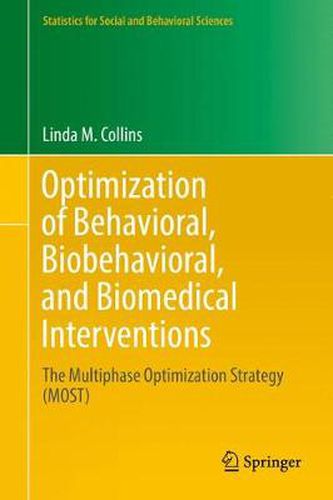Readings Newsletter
Become a Readings Member to make your shopping experience even easier.
Sign in or sign up for free!
You’re not far away from qualifying for FREE standard shipping within Australia
You’ve qualified for FREE standard shipping within Australia
The cart is loading…






This title is printed to order. This book may have been self-published. If so, we cannot guarantee the quality of the content. In the main most books will have gone through the editing process however some may not. We therefore suggest that you be aware of this before ordering this book. If in doubt check either the author or publisher’s details as we are unable to accept any returns unless they are faulty. Please contact us if you have any questions.
This book presents a framework for development, optimization, and evaluation of behavioral, biobehavioral, and biomedical interventions. Behavioral, biobehavioral, and biomedical interventions are programs with the objective of improving and maintaining human health and well-being, broadly defined, in individuals, families, schools, organizations, or communities. These interventions may be aimed at, for example, preventing or treating disease, promoting physical and mental health, preventing violence, or improving academic achievement.
This volume introduces the multiphase optimization strategy (MOST), pioneered at The Methodology Center at the Pennsylvania State University, as an alternative to the classical approach of relying solely on the randomized controlled trial (RCT). MOST borrows heavily from perspectives taken and approaches used in engineering, and also integrates concepts from statistics and behavioral science, including the RCT. As described in detail in this book, MOST consists of three phases: preparation, in which the conceptual model underlying the intervention is articulated; optimization, in which experimentation is used to gather the information necessary to identify the optimized intervention; and evaluation, in which the optimized intervention is evaluated in a standard RCT. Through numerous examples, the book demonstrates that MOST can be used to develop interventions that are more effective, efficient, economical, and scalable.
Optimization of Behavioral, Biobehavioral, and Biomedical Interventions: The Multiphase Optimization Strategy is the first book to present a comprehensive introduction to MOST. It will be an essential resource for behavioral, biobehavioral, and biomedical scientists; statisticians, biostatisticians, and analysts working in epidemiology and public health; and graduate-level courses in development and evaluation of interventions.
$9.00 standard shipping within Australia
FREE standard shipping within Australia for orders over $100.00
Express & International shipping calculated at checkout
This title is printed to order. This book may have been self-published. If so, we cannot guarantee the quality of the content. In the main most books will have gone through the editing process however some may not. We therefore suggest that you be aware of this before ordering this book. If in doubt check either the author or publisher’s details as we are unable to accept any returns unless they are faulty. Please contact us if you have any questions.
This book presents a framework for development, optimization, and evaluation of behavioral, biobehavioral, and biomedical interventions. Behavioral, biobehavioral, and biomedical interventions are programs with the objective of improving and maintaining human health and well-being, broadly defined, in individuals, families, schools, organizations, or communities. These interventions may be aimed at, for example, preventing or treating disease, promoting physical and mental health, preventing violence, or improving academic achievement.
This volume introduces the multiphase optimization strategy (MOST), pioneered at The Methodology Center at the Pennsylvania State University, as an alternative to the classical approach of relying solely on the randomized controlled trial (RCT). MOST borrows heavily from perspectives taken and approaches used in engineering, and also integrates concepts from statistics and behavioral science, including the RCT. As described in detail in this book, MOST consists of three phases: preparation, in which the conceptual model underlying the intervention is articulated; optimization, in which experimentation is used to gather the information necessary to identify the optimized intervention; and evaluation, in which the optimized intervention is evaluated in a standard RCT. Through numerous examples, the book demonstrates that MOST can be used to develop interventions that are more effective, efficient, economical, and scalable.
Optimization of Behavioral, Biobehavioral, and Biomedical Interventions: The Multiphase Optimization Strategy is the first book to present a comprehensive introduction to MOST. It will be an essential resource for behavioral, biobehavioral, and biomedical scientists; statisticians, biostatisticians, and analysts working in epidemiology and public health; and graduate-level courses in development and evaluation of interventions.